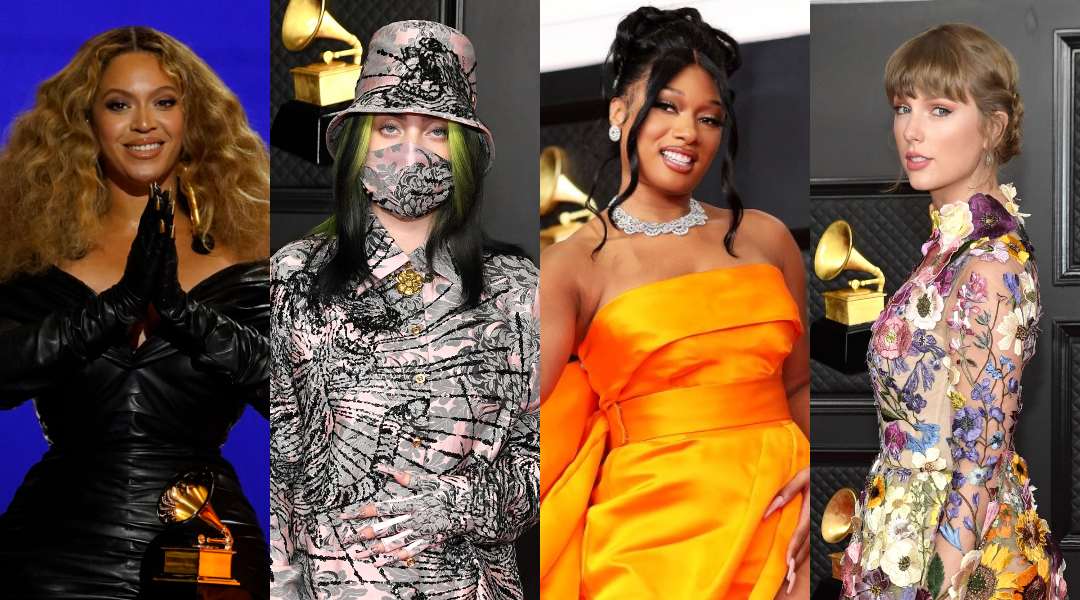The future isn’t female during the 63rd Grammy Awards but a happy present. But why is there still an overall disparity?
While this year’s Grammys are still riddled with controversy, some good did come out of it. Women, in particular, won big throughout the night and swept the four major awards: Taylor Swift for Album of the Year; Billie Eilish for Record of the Year; H.E.R. for Song of the Year; and Megan Thee Stallion for Best New Artist.
Beyoncé also notched another achievement on her belt, and is now the most-awarded woman in the history of the prestigious event. Her 28th, a record-breaking win was for Black Parade, which was awarded as Best R&B Performance.
As with many major award-giving bodies, there is a distinct imbalance between men and women at the Grammys, with the former dominating in terms of nominations and wins. More women are getting more recognized. Last year, for example, Billie Eilish swept the four major awards, and this year, Dua Lipa was nominated for six and won one. (She bagged Best Pop Vocal Album for Future Nostalgia.) But eliminating gender disparity remains a work in progress.
RELATED READS: Grammys 2021 Recap: #Scammys And The Awards’ History Of Exclusion

Groundbreaking wins
Swift is the first female artist to win Album of the Year three times. The first time was in 2010 with Fearless, in 2016 with 1989, and now in 2021 with Folklore. Only Stevie Wonder, Frank Sinatra, and Paul Simon have achieved the feat.
Beyoncé’s record-breaking 28th Grammy nod was from an impressive 79 nominations. In 2010, she won six awards wins in one night, an achievement that was matched by Adele seven years later. Most of Beyoncé’s, though, are under the R&B category with only 2010’s “Single Ladies” bagging a major award for the global superstar.
RELATED READS: Power Through The Day As These Inspiring Women Reveal Their Motivating Morning Routine

Facing mountains
From 2012 to 2019, only 27.1 percent are female artists in 800 single US charts alone. Behind the scenes, 14.4 percent are female songwriters in 2019 while 2.6 percent are female producers from the 800 songs analyzed. The situation in Britain is disappointingly similar. A study by Vick Bain, former CEO of the British Academy of Songwriters, Composers, and Authors (BASCA), reveals out of 30,000 musicians, 14 percent are women signed to publishers while 20 percent are women signed to labels from a pool of 300.
In this year’s Grammys, only 23 percent or 198 out of 853 nominees identify as women. This includes Beyoncé who has nine nominations and Dua Lipa and Swift who each have six.
Nevertheless, these worrying figures reinforce what former Recording Academy CEO Deborah Dugan referred to as the “boys’ club” within the award-giving body. With a small percentage of acceptance for women in the music industry, it is not surprising even for the most prestigious award show to be highly selective with their nomination process.

Problematic system
What makes it difficult for women to be accepted by the industry is obviously not a lack of talent and creativity—it is the people seated on top and the institution that operates on favoritism.
For instance, while rappers gain ground in the genre in a do-it-yourself approach, pop relies on the ‘infrastructure’ or the background holding up the artist. So, if the latter doesn’t have the proper backing that the “boys’ club” favors, then that artist must work harder than ever.
But then again, does hard work amount to anything when the system works against the artist? For now, the only hope we can see is through the continuous remarkable and impactful works of women artists. Women will never stop influencing change. As more people support this and call out systemic sexism at the same time, there is hope for the industry to finally wake up and implement long-overdue changes.





